A Comprehensive Report: Effects of Drug Use on Children and Teenagers
VerifiedAdded on 2023/01/09
|42
|12635
|49
Report
AI Summary
This report delves into the multifaceted effects of drug use on children and teenagers, focusing on the UK context. It explores the physiological and behavioral changes associated with drug consumption, including the impact on brain development, mental and physical wellbeing, and long-term health outcomes. The report investigates factors contributing to drug addiction, such as experimentation, peer influence, and family dynamics. It analyzes the societal and familial consequences of increasing drug use rates, encompassing issues like crime, healthcare burdens, and family breakdown. Furthermore, the report identifies and evaluates various prevention strategies, including educational programs, counseling, and early intervention techniques. The methodology section details the sources, search parameters, inclusion and exclusion criteria, and the sample design used for the research. The findings and outcomes are presented, along with a comprehensive conclusion summarizing the key insights and implications of the study. The report emphasizes the need for awareness, education, and proactive measures to protect children and teenagers from the devastating consequences of drug abuse.
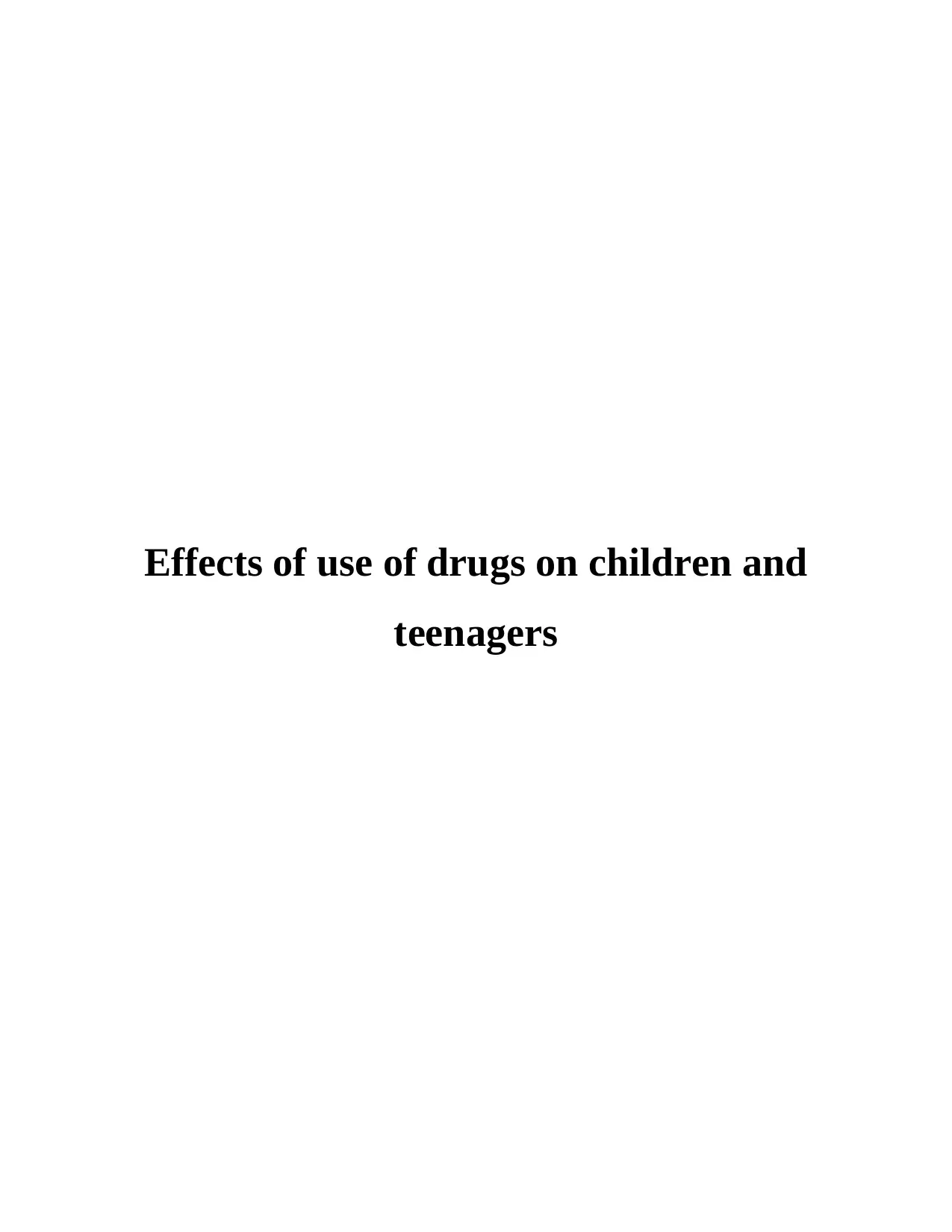
Effects of use of drugs on children and
teenagers
teenagers
Paraphrase This Document
Need a fresh take? Get an instant paraphrase of this document with our AI Paraphraser

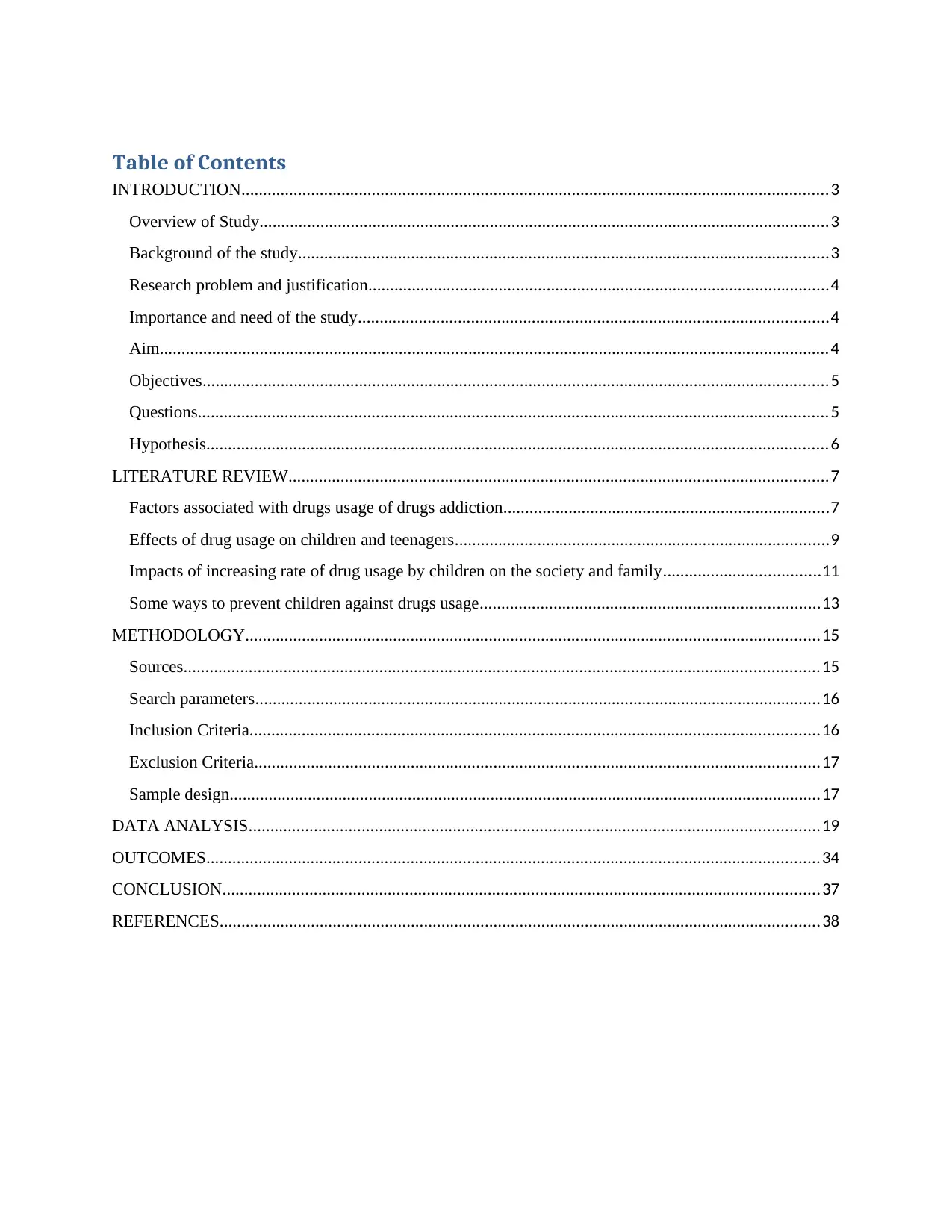
Table of Contents
INTRODUCTION.......................................................................................................................................3
Overview of Study...................................................................................................................................3
Background of the study..........................................................................................................................3
Research problem and justification..........................................................................................................4
Importance and need of the study............................................................................................................4
Aim..........................................................................................................................................................4
Objectives................................................................................................................................................5
Questions.................................................................................................................................................5
Hypothesis...............................................................................................................................................6
LITERATURE REVIEW............................................................................................................................7
Factors associated with drugs usage of drugs addiction...........................................................................7
Effects of drug usage on children and teenagers......................................................................................9
Impacts of increasing rate of drug usage by children on the society and family....................................11
Some ways to prevent children against drugs usage..............................................................................13
METHODOLOGY....................................................................................................................................15
Sources..................................................................................................................................................15
Search parameters..................................................................................................................................16
Inclusion Criteria...................................................................................................................................16
Exclusion Criteria..................................................................................................................................17
Sample design........................................................................................................................................17
DATA ANALYSIS...................................................................................................................................19
OUTCOMES.............................................................................................................................................34
CONCLUSION.........................................................................................................................................37
REFERENCES..........................................................................................................................................38
INTRODUCTION.......................................................................................................................................3
Overview of Study...................................................................................................................................3
Background of the study..........................................................................................................................3
Research problem and justification..........................................................................................................4
Importance and need of the study............................................................................................................4
Aim..........................................................................................................................................................4
Objectives................................................................................................................................................5
Questions.................................................................................................................................................5
Hypothesis...............................................................................................................................................6
LITERATURE REVIEW............................................................................................................................7
Factors associated with drugs usage of drugs addiction...........................................................................7
Effects of drug usage on children and teenagers......................................................................................9
Impacts of increasing rate of drug usage by children on the society and family....................................11
Some ways to prevent children against drugs usage..............................................................................13
METHODOLOGY....................................................................................................................................15
Sources..................................................................................................................................................15
Search parameters..................................................................................................................................16
Inclusion Criteria...................................................................................................................................16
Exclusion Criteria..................................................................................................................................17
Sample design........................................................................................................................................17
DATA ANALYSIS...................................................................................................................................19
OUTCOMES.............................................................................................................................................34
CONCLUSION.........................................................................................................................................37
REFERENCES..........................................................................................................................................38
⊘ This is a preview!⊘
Do you want full access?
Subscribe today to unlock all pages.

Trusted by 1+ million students worldwide
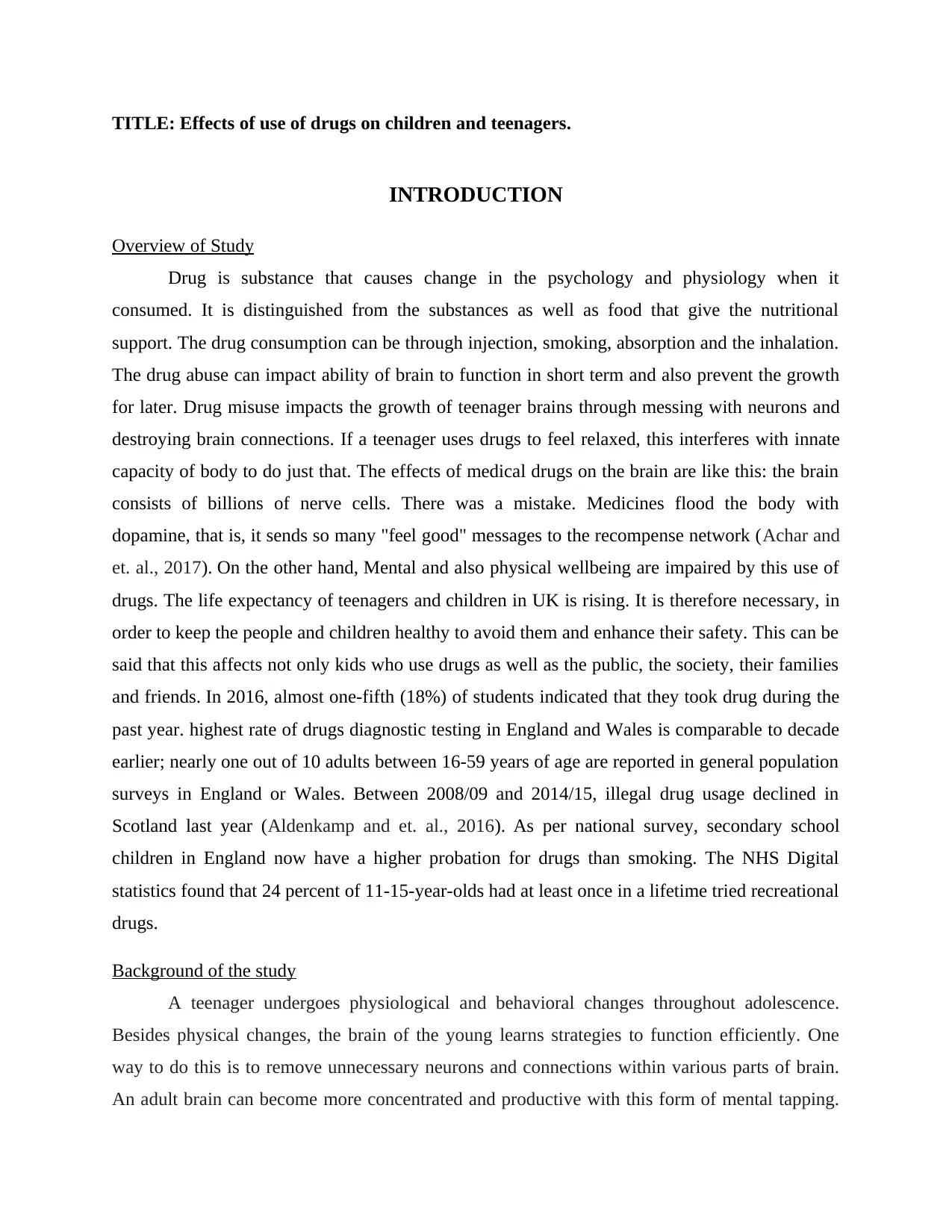
TITLE: Effects of use of drugs on children and teenagers.
INTRODUCTION
Overview of Study
Drug is substance that causes change in the psychology and physiology when it
consumed. It is distinguished from the substances as well as food that give the nutritional
support. The drug consumption can be through injection, smoking, absorption and the inhalation.
The drug abuse can impact ability of brain to function in short term and also prevent the growth
for later. Drug misuse impacts the growth of teenager brains through messing with neurons and
destroying brain connections. If a teenager uses drugs to feel relaxed, this interferes with innate
capacity of body to do just that. The effects of medical drugs on the brain are like this: the brain
consists of billions of nerve cells. There was a mistake. Medicines flood the body with
dopamine, that is, it sends so many "feel good" messages to the recompense network (Achar and
et. al., 2017). On the other hand, Mental and also physical wellbeing are impaired by this use of
drugs. The life expectancy of teenagers and children in UK is rising. It is therefore necessary, in
order to keep the people and children healthy to avoid them and enhance their safety. This can be
said that this affects not only kids who use drugs as well as the public, the society, their families
and friends. In 2016, almost one-fifth (18%) of students indicated that they took drug during the
past year. highest rate of drugs diagnostic testing in England and Wales is comparable to decade
earlier; nearly one out of 10 adults between 16-59 years of age are reported in general population
surveys in England or Wales. Between 2008/09 and 2014/15, illegal drug usage declined in
Scotland last year (Aldenkamp and et. al., 2016). As per national survey, secondary school
children in England now have a higher probation for drugs than smoking. The NHS Digital
statistics found that 24 percent of 11-15-year-olds had at least once in a lifetime tried recreational
drugs.
Background of the study
A teenager undergoes physiological and behavioral changes throughout adolescence.
Besides physical changes, the brain of the young learns strategies to function efficiently. One
way to do this is to remove unnecessary neurons and connections within various parts of brain.
An adult brain can become more concentrated and productive with this form of mental tapping.
INTRODUCTION
Overview of Study
Drug is substance that causes change in the psychology and physiology when it
consumed. It is distinguished from the substances as well as food that give the nutritional
support. The drug consumption can be through injection, smoking, absorption and the inhalation.
The drug abuse can impact ability of brain to function in short term and also prevent the growth
for later. Drug misuse impacts the growth of teenager brains through messing with neurons and
destroying brain connections. If a teenager uses drugs to feel relaxed, this interferes with innate
capacity of body to do just that. The effects of medical drugs on the brain are like this: the brain
consists of billions of nerve cells. There was a mistake. Medicines flood the body with
dopamine, that is, it sends so many "feel good" messages to the recompense network (Achar and
et. al., 2017). On the other hand, Mental and also physical wellbeing are impaired by this use of
drugs. The life expectancy of teenagers and children in UK is rising. It is therefore necessary, in
order to keep the people and children healthy to avoid them and enhance their safety. This can be
said that this affects not only kids who use drugs as well as the public, the society, their families
and friends. In 2016, almost one-fifth (18%) of students indicated that they took drug during the
past year. highest rate of drugs diagnostic testing in England and Wales is comparable to decade
earlier; nearly one out of 10 adults between 16-59 years of age are reported in general population
surveys in England or Wales. Between 2008/09 and 2014/15, illegal drug usage declined in
Scotland last year (Aldenkamp and et. al., 2016). As per national survey, secondary school
children in England now have a higher probation for drugs than smoking. The NHS Digital
statistics found that 24 percent of 11-15-year-olds had at least once in a lifetime tried recreational
drugs.
Background of the study
A teenager undergoes physiological and behavioral changes throughout adolescence.
Besides physical changes, the brain of the young learns strategies to function efficiently. One
way to do this is to remove unnecessary neurons and connections within various parts of brain.
An adult brain can become more concentrated and productive with this form of mental tapping.
Paraphrase This Document
Need a fresh take? Get an instant paraphrase of this document with our AI Paraphraser
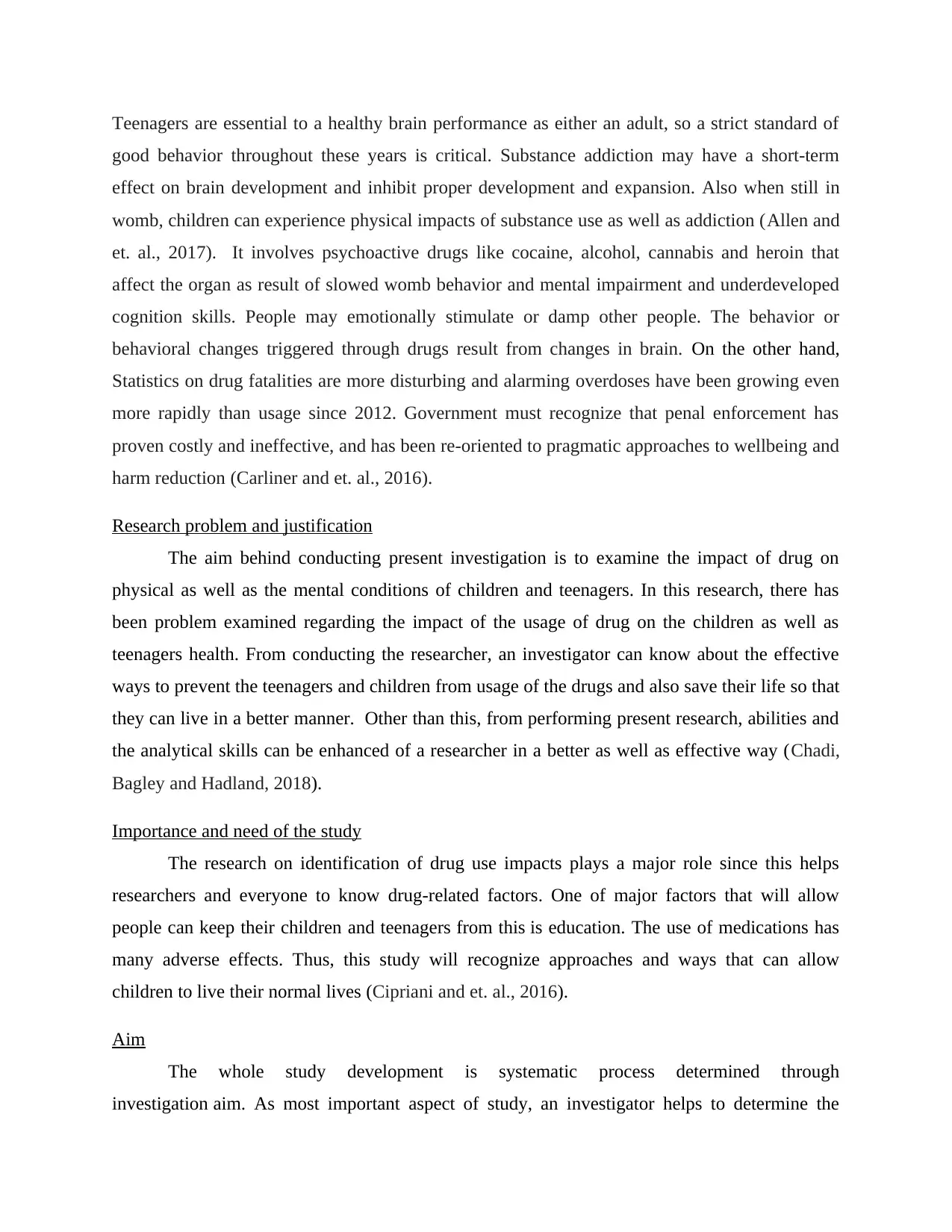
Teenagers are essential to a healthy brain performance as either an adult, so a strict standard of
good behavior throughout these years is critical. Substance addiction may have a short-term
effect on brain development and inhibit proper development and expansion. Also when still in
womb, children can experience physical impacts of substance use as well as addiction (Allen and
et. al., 2017). It involves psychoactive drugs like cocaine, alcohol, cannabis and heroin that
affect the organ as result of slowed womb behavior and mental impairment and underdeveloped
cognition skills. People may emotionally stimulate or damp other people. The behavior or
behavioral changes triggered through drugs result from changes in brain. On the other hand,
Statistics on drug fatalities are more disturbing and alarming overdoses have been growing even
more rapidly than usage since 2012. Government must recognize that penal enforcement has
proven costly and ineffective, and has been re-oriented to pragmatic approaches to wellbeing and
harm reduction (Carliner and et. al., 2016).
Research problem and justification
The aim behind conducting present investigation is to examine the impact of drug on
physical as well as the mental conditions of children and teenagers. In this research, there has
been problem examined regarding the impact of the usage of drug on the children as well as
teenagers health. From conducting the researcher, an investigator can know about the effective
ways to prevent the teenagers and children from usage of the drugs and also save their life so that
they can live in a better manner. Other than this, from performing present research, abilities and
the analytical skills can be enhanced of a researcher in a better as well as effective way (Chadi,
Bagley and Hadland, 2018).
Importance and need of the study
The research on identification of drug use impacts plays a major role since this helps
researchers and everyone to know drug-related factors. One of major factors that will allow
people can keep their children and teenagers from this is education. The use of medications has
many adverse effects. Thus, this study will recognize approaches and ways that can allow
children to live their normal lives (Cipriani and et. al., 2016).
Aim
The whole study development is systematic process determined through
investigation aim. As most important aspect of study, an investigator helps to determine the
good behavior throughout these years is critical. Substance addiction may have a short-term
effect on brain development and inhibit proper development and expansion. Also when still in
womb, children can experience physical impacts of substance use as well as addiction (Allen and
et. al., 2017). It involves psychoactive drugs like cocaine, alcohol, cannabis and heroin that
affect the organ as result of slowed womb behavior and mental impairment and underdeveloped
cognition skills. People may emotionally stimulate or damp other people. The behavior or
behavioral changes triggered through drugs result from changes in brain. On the other hand,
Statistics on drug fatalities are more disturbing and alarming overdoses have been growing even
more rapidly than usage since 2012. Government must recognize that penal enforcement has
proven costly and ineffective, and has been re-oriented to pragmatic approaches to wellbeing and
harm reduction (Carliner and et. al., 2016).
Research problem and justification
The aim behind conducting present investigation is to examine the impact of drug on
physical as well as the mental conditions of children and teenagers. In this research, there has
been problem examined regarding the impact of the usage of drug on the children as well as
teenagers health. From conducting the researcher, an investigator can know about the effective
ways to prevent the teenagers and children from usage of the drugs and also save their life so that
they can live in a better manner. Other than this, from performing present research, abilities and
the analytical skills can be enhanced of a researcher in a better as well as effective way (Chadi,
Bagley and Hadland, 2018).
Importance and need of the study
The research on identification of drug use impacts plays a major role since this helps
researchers and everyone to know drug-related factors. One of major factors that will allow
people can keep their children and teenagers from this is education. The use of medications has
many adverse effects. Thus, this study will recognize approaches and ways that can allow
children to live their normal lives (Cipriani and et. al., 2016).
Aim
The whole study development is systematic process determined through
investigation aim. As most important aspect of study, an investigator helps to determine the
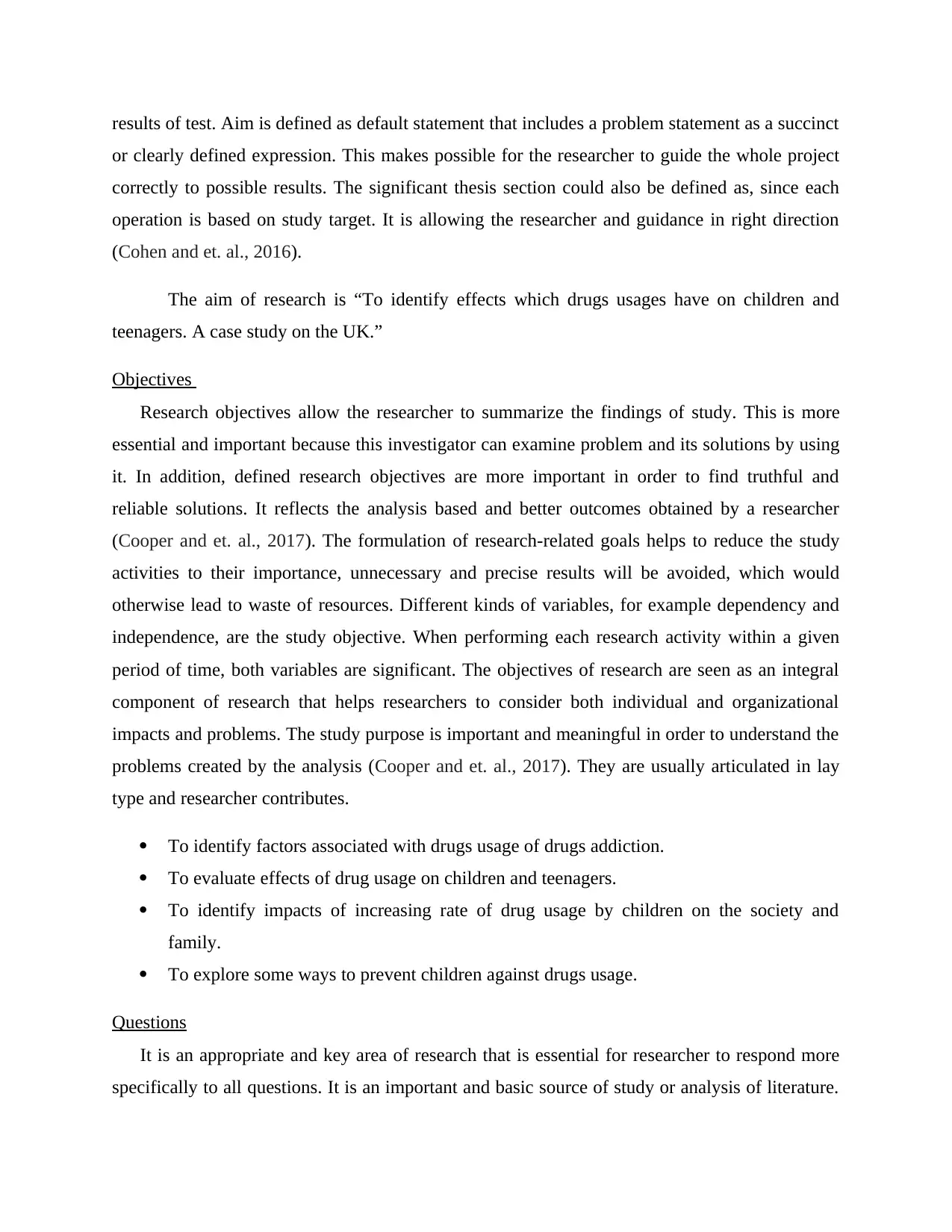
results of test. Aim is defined as default statement that includes a problem statement as a succinct
or clearly defined expression. This makes possible for the researcher to guide the whole project
correctly to possible results. The significant thesis section could also be defined as, since each
operation is based on study target. It is allowing the researcher and guidance in right direction
(Cohen and et. al., 2016).
The aim of research is “To identify effects which drugs usages have on children and
teenagers. A case study on the UK.”
Objectives
Research objectives allow the researcher to summarize the findings of study. This is more
essential and important because this investigator can examine problem and its solutions by using
it. In addition, defined research objectives are more important in order to find truthful and
reliable solutions. It reflects the analysis based and better outcomes obtained by a researcher
(Cooper and et. al., 2017). The formulation of research-related goals helps to reduce the study
activities to their importance, unnecessary and precise results will be avoided, which would
otherwise lead to waste of resources. Different kinds of variables, for example dependency and
independence, are the study objective. When performing each research activity within a given
period of time, both variables are significant. The objectives of research are seen as an integral
component of research that helps researchers to consider both individual and organizational
impacts and problems. The study purpose is important and meaningful in order to understand the
problems created by the analysis (Cooper and et. al., 2017). They are usually articulated in lay
type and researcher contributes.
To identify factors associated with drugs usage of drugs addiction.
To evaluate effects of drug usage on children and teenagers.
To identify impacts of increasing rate of drug usage by children on the society and
family.
To explore some ways to prevent children against drugs usage.
Questions
It is an appropriate and key area of research that is essential for researcher to respond more
specifically to all questions. It is an important and basic source of study or analysis of literature.
or clearly defined expression. This makes possible for the researcher to guide the whole project
correctly to possible results. The significant thesis section could also be defined as, since each
operation is based on study target. It is allowing the researcher and guidance in right direction
(Cohen and et. al., 2016).
The aim of research is “To identify effects which drugs usages have on children and
teenagers. A case study on the UK.”
Objectives
Research objectives allow the researcher to summarize the findings of study. This is more
essential and important because this investigator can examine problem and its solutions by using
it. In addition, defined research objectives are more important in order to find truthful and
reliable solutions. It reflects the analysis based and better outcomes obtained by a researcher
(Cooper and et. al., 2017). The formulation of research-related goals helps to reduce the study
activities to their importance, unnecessary and precise results will be avoided, which would
otherwise lead to waste of resources. Different kinds of variables, for example dependency and
independence, are the study objective. When performing each research activity within a given
period of time, both variables are significant. The objectives of research are seen as an integral
component of research that helps researchers to consider both individual and organizational
impacts and problems. The study purpose is important and meaningful in order to understand the
problems created by the analysis (Cooper and et. al., 2017). They are usually articulated in lay
type and researcher contributes.
To identify factors associated with drugs usage of drugs addiction.
To evaluate effects of drug usage on children and teenagers.
To identify impacts of increasing rate of drug usage by children on the society and
family.
To explore some ways to prevent children against drugs usage.
Questions
It is an appropriate and key area of research that is essential for researcher to respond more
specifically to all questions. It is an important and basic source of study or analysis of literature.
⊘ This is a preview!⊘
Do you want full access?
Subscribe today to unlock all pages.

Trusted by 1+ million students worldwide
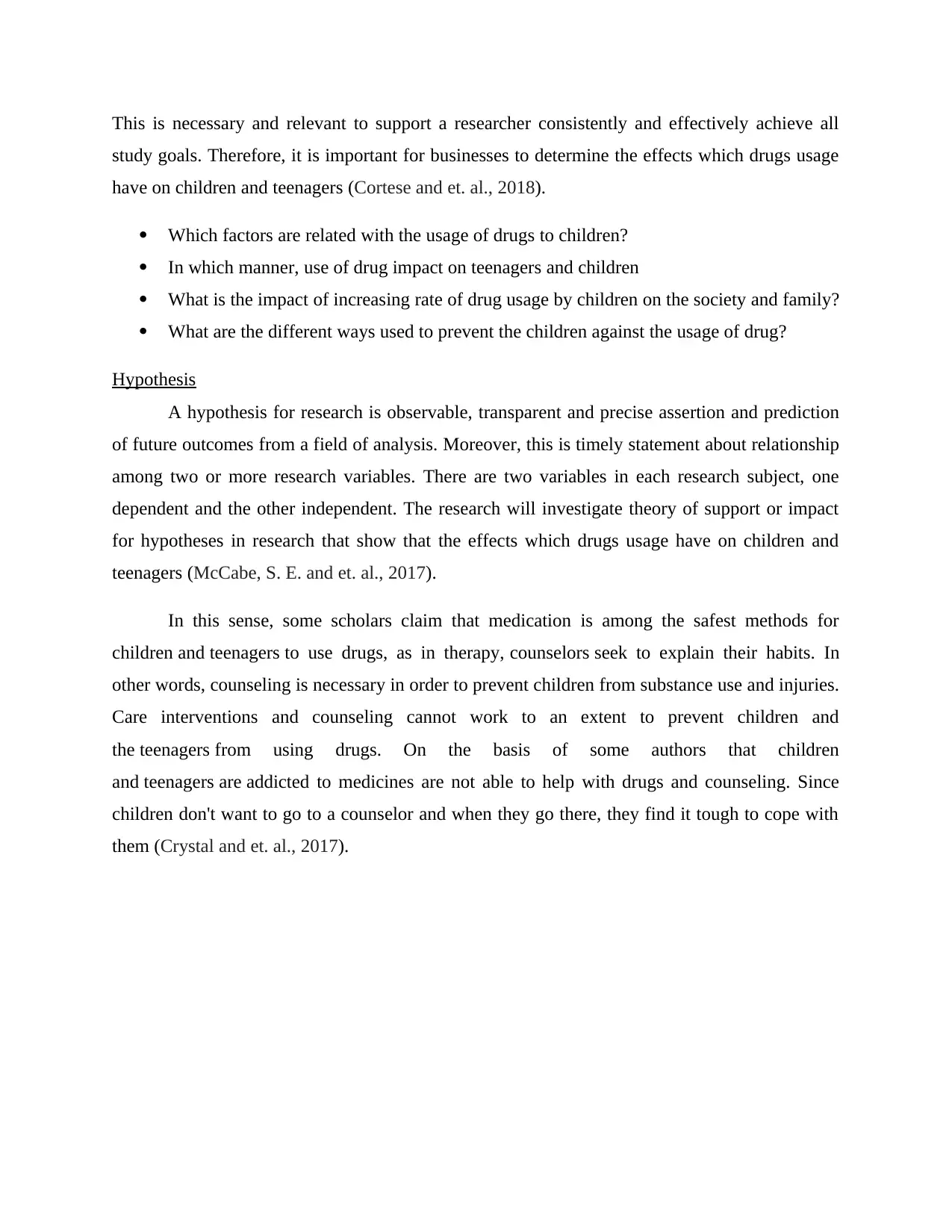
This is necessary and relevant to support a researcher consistently and effectively achieve all
study goals. Therefore, it is important for businesses to determine the effects which drugs usage
have on children and teenagers (Cortese and et. al., 2018).
Which factors are related with the usage of drugs to children?
In which manner, use of drug impact on teenagers and children
What is the impact of increasing rate of drug usage by children on the society and family?
What are the different ways used to prevent the children against the usage of drug?
Hypothesis
A hypothesis for research is observable, transparent and precise assertion and prediction
of future outcomes from a field of analysis. Moreover, this is timely statement about relationship
among two or more research variables. There are two variables in each research subject, one
dependent and the other independent. The research will investigate theory of support or impact
for hypotheses in research that show that the effects which drugs usage have on children and
teenagers (McCabe, S. E. and et. al., 2017).
In this sense, some scholars claim that medication is among the safest methods for
children and teenagers to use drugs, as in therapy, counselors seek to explain their habits. In
other words, counseling is necessary in order to prevent children from substance use and injuries.
Care interventions and counseling cannot work to an extent to prevent children and
the teenagers from using drugs. On the basis of some authors that children
and teenagers are addicted to medicines are not able to help with drugs and counseling. Since
children don't want to go to a counselor and when they go there, they find it tough to cope with
them (Crystal and et. al., 2017).
study goals. Therefore, it is important for businesses to determine the effects which drugs usage
have on children and teenagers (Cortese and et. al., 2018).
Which factors are related with the usage of drugs to children?
In which manner, use of drug impact on teenagers and children
What is the impact of increasing rate of drug usage by children on the society and family?
What are the different ways used to prevent the children against the usage of drug?
Hypothesis
A hypothesis for research is observable, transparent and precise assertion and prediction
of future outcomes from a field of analysis. Moreover, this is timely statement about relationship
among two or more research variables. There are two variables in each research subject, one
dependent and the other independent. The research will investigate theory of support or impact
for hypotheses in research that show that the effects which drugs usage have on children and
teenagers (McCabe, S. E. and et. al., 2017).
In this sense, some scholars claim that medication is among the safest methods for
children and teenagers to use drugs, as in therapy, counselors seek to explain their habits. In
other words, counseling is necessary in order to prevent children from substance use and injuries.
Care interventions and counseling cannot work to an extent to prevent children and
the teenagers from using drugs. On the basis of some authors that children
and teenagers are addicted to medicines are not able to help with drugs and counseling. Since
children don't want to go to a counselor and when they go there, they find it tough to cope with
them (Crystal and et. al., 2017).
Paraphrase This Document
Need a fresh take? Get an instant paraphrase of this document with our AI Paraphraser
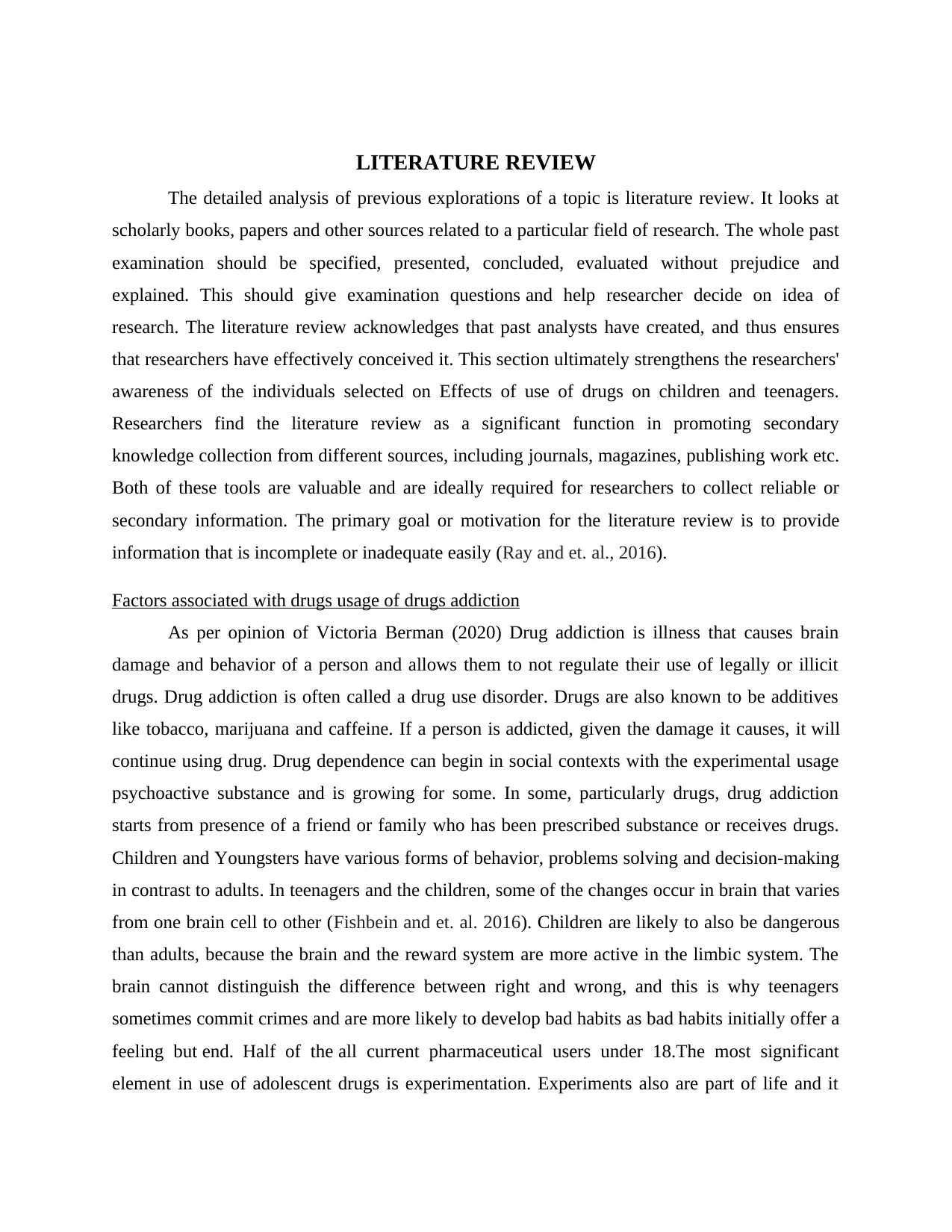
LITERATURE REVIEW
The detailed analysis of previous explorations of a topic is literature review. It looks at
scholarly books, papers and other sources related to a particular field of research. The whole past
examination should be specified, presented, concluded, evaluated without prejudice and
explained. This should give examination questions and help researcher decide on idea of
research. The literature review acknowledges that past analysts have created, and thus ensures
that researchers have effectively conceived it. This section ultimately strengthens the researchers'
awareness of the individuals selected on Effects of use of drugs on children and teenagers.
Researchers find the literature review as a significant function in promoting secondary
knowledge collection from different sources, including journals, magazines, publishing work etc.
Both of these tools are valuable and are ideally required for researchers to collect reliable or
secondary information. The primary goal or motivation for the literature review is to provide
information that is incomplete or inadequate easily (Ray and et. al., 2016).
Factors associated with drugs usage of drugs addiction
As per opinion of Victoria Berman (2020) Drug addiction is illness that causes brain
damage and behavior of a person and allows them to not regulate their use of legally or illicit
drugs. Drug addiction is often called a drug use disorder. Drugs are also known to be additives
like tobacco, marijuana and caffeine. If a person is addicted, given the damage it causes, it will
continue using drug. Drug dependence can begin in social contexts with the experimental usage
psychoactive substance and is growing for some. In some, particularly drugs, drug addiction
starts from presence of a friend or family who has been prescribed substance or receives drugs.
Children and Youngsters have various forms of behavior, problems solving and decision-making
in contrast to adults. In teenagers and the children, some of the changes occur in brain that varies
from one brain cell to other (Fishbein and et. al. 2016). Children are likely to also be dangerous
than adults, because the brain and the reward system are more active in the limbic system. The
brain cannot distinguish the difference between right and wrong, and this is why teenagers
sometimes commit crimes and are more likely to develop bad habits as bad habits initially offer a
feeling but end. Half of the all current pharmaceutical users under 18.The most significant
element in use of adolescent drugs is experimentation. Experiments also are part of life and it
The detailed analysis of previous explorations of a topic is literature review. It looks at
scholarly books, papers and other sources related to a particular field of research. The whole past
examination should be specified, presented, concluded, evaluated without prejudice and
explained. This should give examination questions and help researcher decide on idea of
research. The literature review acknowledges that past analysts have created, and thus ensures
that researchers have effectively conceived it. This section ultimately strengthens the researchers'
awareness of the individuals selected on Effects of use of drugs on children and teenagers.
Researchers find the literature review as a significant function in promoting secondary
knowledge collection from different sources, including journals, magazines, publishing work etc.
Both of these tools are valuable and are ideally required for researchers to collect reliable or
secondary information. The primary goal or motivation for the literature review is to provide
information that is incomplete or inadequate easily (Ray and et. al., 2016).
Factors associated with drugs usage of drugs addiction
As per opinion of Victoria Berman (2020) Drug addiction is illness that causes brain
damage and behavior of a person and allows them to not regulate their use of legally or illicit
drugs. Drug addiction is often called a drug use disorder. Drugs are also known to be additives
like tobacco, marijuana and caffeine. If a person is addicted, given the damage it causes, it will
continue using drug. Drug dependence can begin in social contexts with the experimental usage
psychoactive substance and is growing for some. In some, particularly drugs, drug addiction
starts from presence of a friend or family who has been prescribed substance or receives drugs.
Children and Youngsters have various forms of behavior, problems solving and decision-making
in contrast to adults. In teenagers and the children, some of the changes occur in brain that varies
from one brain cell to other (Fishbein and et. al. 2016). Children are likely to also be dangerous
than adults, because the brain and the reward system are more active in the limbic system. The
brain cannot distinguish the difference between right and wrong, and this is why teenagers
sometimes commit crimes and are more likely to develop bad habits as bad habits initially offer a
feeling but end. Half of the all current pharmaceutical users under 18.The most significant
element in use of adolescent drugs is experimentation. Experiments also are part of life and it
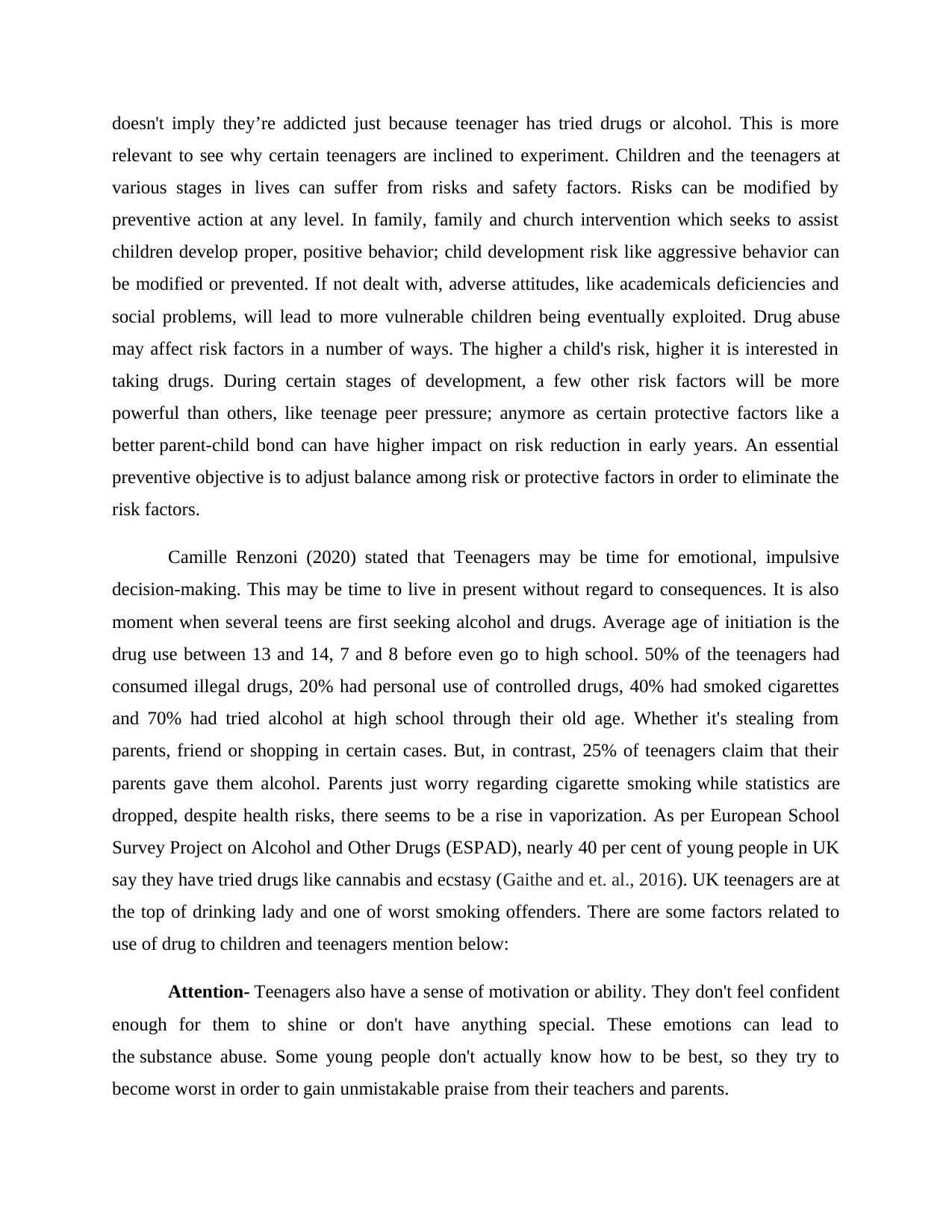
doesn't imply they’re addicted just because teenager has tried drugs or alcohol. This is more
relevant to see why certain teenagers are inclined to experiment. Children and the teenagers at
various stages in lives can suffer from risks and safety factors. Risks can be modified by
preventive action at any level. In family, family and church intervention which seeks to assist
children develop proper, positive behavior; child development risk like aggressive behavior can
be modified or prevented. If not dealt with, adverse attitudes, like academicals deficiencies and
social problems, will lead to more vulnerable children being eventually exploited. Drug abuse
may affect risk factors in a number of ways. The higher a child's risk, higher it is interested in
taking drugs. During certain stages of development, a few other risk factors will be more
powerful than others, like teenage peer pressure; anymore as certain protective factors like a
better parent-child bond can have higher impact on risk reduction in early years. An essential
preventive objective is to adjust balance among risk or protective factors in order to eliminate the
risk factors.
Camille Renzoni (2020) stated that Teenagers may be time for emotional, impulsive
decision-making. This may be time to live in present without regard to consequences. It is also
moment when several teens are first seeking alcohol and drugs. Average age of initiation is the
drug use between 13 and 14, 7 and 8 before even go to high school. 50% of the teenagers had
consumed illegal drugs, 20% had personal use of controlled drugs, 40% had smoked cigarettes
and 70% had tried alcohol at high school through their old age. Whether it's stealing from
parents, friend or shopping in certain cases. But, in contrast, 25% of teenagers claim that their
parents gave them alcohol. Parents just worry regarding cigarette smoking while statistics are
dropped, despite health risks, there seems to be a rise in vaporization. As per European School
Survey Project on Alcohol and Other Drugs (ESPAD), nearly 40 per cent of young people in UK
say they have tried drugs like cannabis and ecstasy (Gaithe and et. al., 2016). UK teenagers are at
the top of drinking lady and one of worst smoking offenders. There are some factors related to
use of drug to children and teenagers mention below:
Attention- Teenagers also have a sense of motivation or ability. They don't feel confident
enough for them to shine or don't have anything special. These emotions can lead to
the substance abuse. Some young people don't actually know how to be best, so they try to
become worst in order to gain unmistakable praise from their teachers and parents.
relevant to see why certain teenagers are inclined to experiment. Children and the teenagers at
various stages in lives can suffer from risks and safety factors. Risks can be modified by
preventive action at any level. In family, family and church intervention which seeks to assist
children develop proper, positive behavior; child development risk like aggressive behavior can
be modified or prevented. If not dealt with, adverse attitudes, like academicals deficiencies and
social problems, will lead to more vulnerable children being eventually exploited. Drug abuse
may affect risk factors in a number of ways. The higher a child's risk, higher it is interested in
taking drugs. During certain stages of development, a few other risk factors will be more
powerful than others, like teenage peer pressure; anymore as certain protective factors like a
better parent-child bond can have higher impact on risk reduction in early years. An essential
preventive objective is to adjust balance among risk or protective factors in order to eliminate the
risk factors.
Camille Renzoni (2020) stated that Teenagers may be time for emotional, impulsive
decision-making. This may be time to live in present without regard to consequences. It is also
moment when several teens are first seeking alcohol and drugs. Average age of initiation is the
drug use between 13 and 14, 7 and 8 before even go to high school. 50% of the teenagers had
consumed illegal drugs, 20% had personal use of controlled drugs, 40% had smoked cigarettes
and 70% had tried alcohol at high school through their old age. Whether it's stealing from
parents, friend or shopping in certain cases. But, in contrast, 25% of teenagers claim that their
parents gave them alcohol. Parents just worry regarding cigarette smoking while statistics are
dropped, despite health risks, there seems to be a rise in vaporization. As per European School
Survey Project on Alcohol and Other Drugs (ESPAD), nearly 40 per cent of young people in UK
say they have tried drugs like cannabis and ecstasy (Gaithe and et. al., 2016). UK teenagers are at
the top of drinking lady and one of worst smoking offenders. There are some factors related to
use of drug to children and teenagers mention below:
Attention- Teenagers also have a sense of motivation or ability. They don't feel confident
enough for them to shine or don't have anything special. These emotions can lead to
the substance abuse. Some young people don't actually know how to be best, so they try to
become worst in order to gain unmistakable praise from their teachers and parents.
⊘ This is a preview!⊘
Do you want full access?
Subscribe today to unlock all pages.

Trusted by 1+ million students worldwide
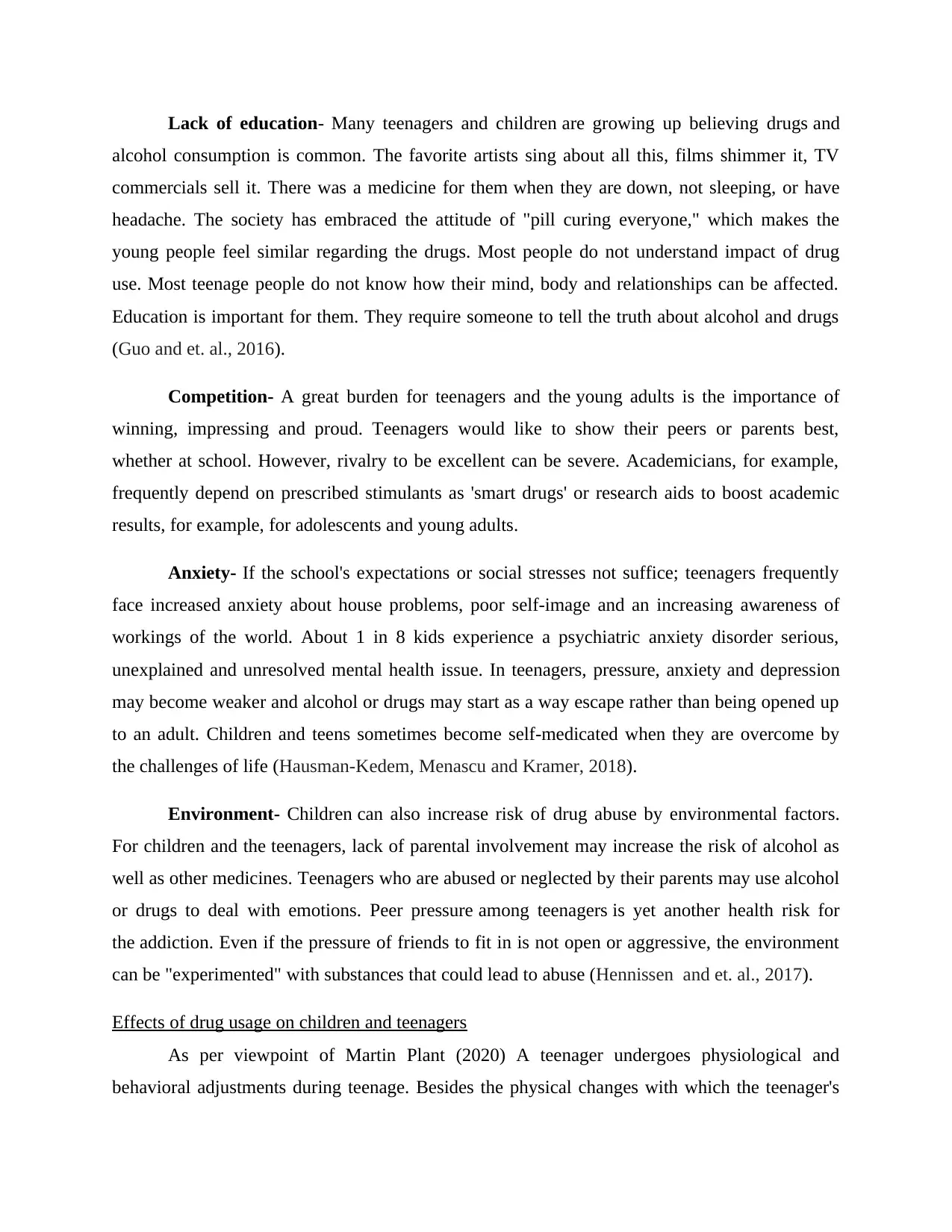
Lack of education- Many teenagers and children are growing up believing drugs and
alcohol consumption is common. The favorite artists sing about all this, films shimmer it, TV
commercials sell it. There was a medicine for them when they are down, not sleeping, or have
headache. The society has embraced the attitude of "pill curing everyone," which makes the
young people feel similar regarding the drugs. Most people do not understand impact of drug
use. Most teenage people do not know how their mind, body and relationships can be affected.
Education is important for them. They require someone to tell the truth about alcohol and drugs
(Guo and et. al., 2016).
Competition- A great burden for teenagers and the young adults is the importance of
winning, impressing and proud. Teenagers would like to show their peers or parents best,
whether at school. However, rivalry to be excellent can be severe. Academicians, for example,
frequently depend on prescribed stimulants as 'smart drugs' or research aids to boost academic
results, for example, for adolescents and young adults.
Anxiety- If the school's expectations or social stresses not suffice; teenagers frequently
face increased anxiety about house problems, poor self-image and an increasing awareness of
workings of the world. About 1 in 8 kids experience a psychiatric anxiety disorder serious,
unexplained and unresolved mental health issue. In teenagers, pressure, anxiety and depression
may become weaker and alcohol or drugs may start as a way escape rather than being opened up
to an adult. Children and teens sometimes become self-medicated when they are overcome by
the challenges of life (Hausman-Kedem, Menascu and Kramer, 2018).
Environment- Children can also increase risk of drug abuse by environmental factors.
For children and the teenagers, lack of parental involvement may increase the risk of alcohol as
well as other medicines. Teenagers who are abused or neglected by their parents may use alcohol
or drugs to deal with emotions. Peer pressure among teenagers is yet another health risk for
the addiction. Even if the pressure of friends to fit in is not open or aggressive, the environment
can be "experimented" with substances that could lead to abuse (Hennissen and et. al., 2017).
Effects of drug usage on children and teenagers
As per viewpoint of Martin Plant (2020) A teenager undergoes physiological and
behavioral adjustments during teenage. Besides the physical changes with which the teenager's
alcohol consumption is common. The favorite artists sing about all this, films shimmer it, TV
commercials sell it. There was a medicine for them when they are down, not sleeping, or have
headache. The society has embraced the attitude of "pill curing everyone," which makes the
young people feel similar regarding the drugs. Most people do not understand impact of drug
use. Most teenage people do not know how their mind, body and relationships can be affected.
Education is important for them. They require someone to tell the truth about alcohol and drugs
(Guo and et. al., 2016).
Competition- A great burden for teenagers and the young adults is the importance of
winning, impressing and proud. Teenagers would like to show their peers or parents best,
whether at school. However, rivalry to be excellent can be severe. Academicians, for example,
frequently depend on prescribed stimulants as 'smart drugs' or research aids to boost academic
results, for example, for adolescents and young adults.
Anxiety- If the school's expectations or social stresses not suffice; teenagers frequently
face increased anxiety about house problems, poor self-image and an increasing awareness of
workings of the world. About 1 in 8 kids experience a psychiatric anxiety disorder serious,
unexplained and unresolved mental health issue. In teenagers, pressure, anxiety and depression
may become weaker and alcohol or drugs may start as a way escape rather than being opened up
to an adult. Children and teens sometimes become self-medicated when they are overcome by
the challenges of life (Hausman-Kedem, Menascu and Kramer, 2018).
Environment- Children can also increase risk of drug abuse by environmental factors.
For children and the teenagers, lack of parental involvement may increase the risk of alcohol as
well as other medicines. Teenagers who are abused or neglected by their parents may use alcohol
or drugs to deal with emotions. Peer pressure among teenagers is yet another health risk for
the addiction. Even if the pressure of friends to fit in is not open or aggressive, the environment
can be "experimented" with substances that could lead to abuse (Hennissen and et. al., 2017).
Effects of drug usage on children and teenagers
As per viewpoint of Martin Plant (2020) A teenager undergoes physiological and
behavioral adjustments during teenage. Besides the physical changes with which the teenager's
Paraphrase This Document
Need a fresh take? Get an instant paraphrase of this document with our AI Paraphraser
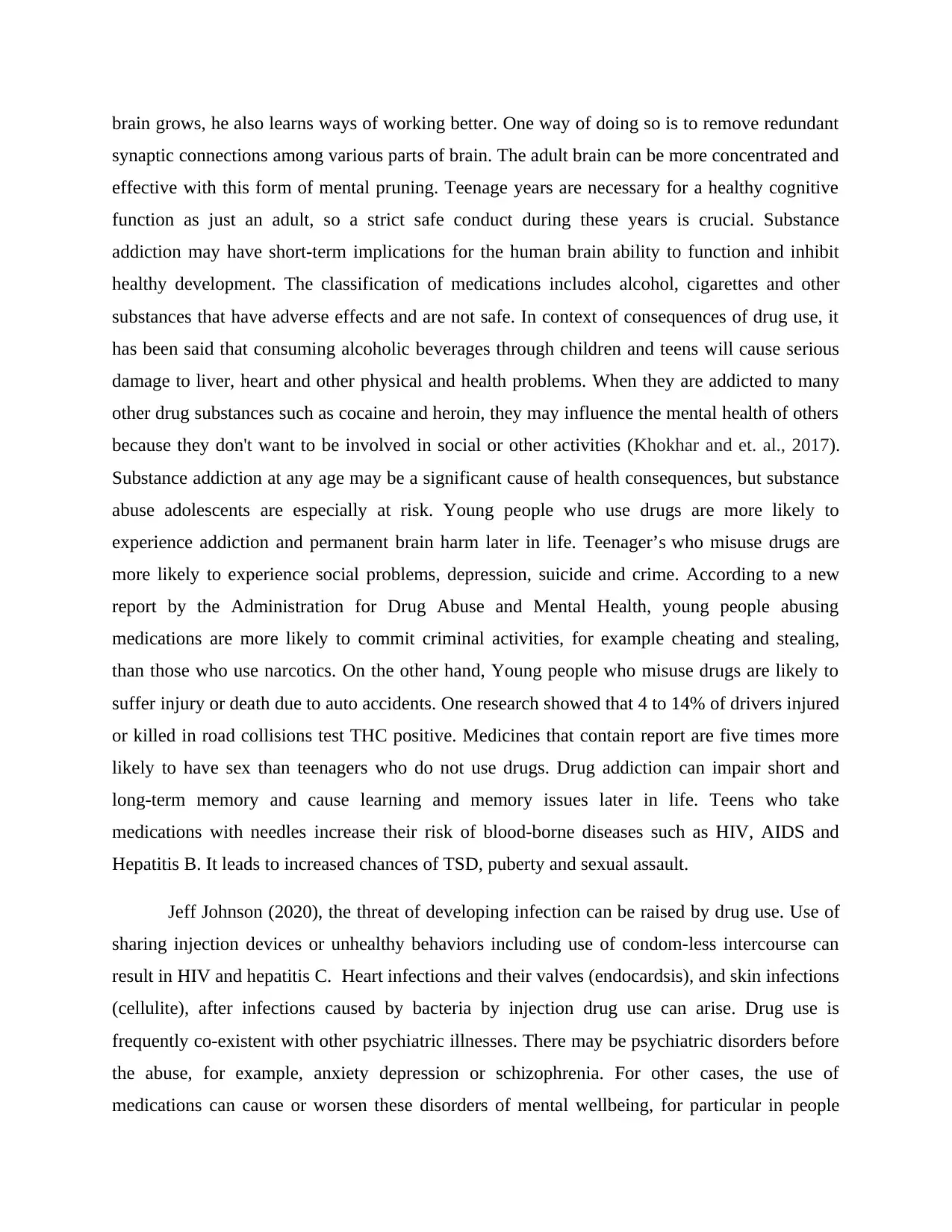
brain grows, he also learns ways of working better. One way of doing so is to remove redundant
synaptic connections among various parts of brain. The adult brain can be more concentrated and
effective with this form of mental pruning. Teenage years are necessary for a healthy cognitive
function as just an adult, so a strict safe conduct during these years is crucial. Substance
addiction may have short-term implications for the human brain ability to function and inhibit
healthy development. The classification of medications includes alcohol, cigarettes and other
substances that have adverse effects and are not safe. In context of consequences of drug use, it
has been said that consuming alcoholic beverages through children and teens will cause serious
damage to liver, heart and other physical and health problems. When they are addicted to many
other drug substances such as cocaine and heroin, they may influence the mental health of others
because they don't want to be involved in social or other activities (Khokhar and et. al., 2017).
Substance addiction at any age may be a significant cause of health consequences, but substance
abuse adolescents are especially at risk. Young people who use drugs are more likely to
experience addiction and permanent brain harm later in life. Teenager’s who misuse drugs are
more likely to experience social problems, depression, suicide and crime. According to a new
report by the Administration for Drug Abuse and Mental Health, young people abusing
medications are more likely to commit criminal activities, for example cheating and stealing,
than those who use narcotics. On the other hand, Young people who misuse drugs are likely to
suffer injury or death due to auto accidents. One research showed that 4 to 14% of drivers injured
or killed in road collisions test THC positive. Medicines that contain report are five times more
likely to have sex than teenagers who do not use drugs. Drug addiction can impair short and
long-term memory and cause learning and memory issues later in life. Teens who take
medications with needles increase their risk of blood-borne diseases such as HIV, AIDS and
Hepatitis B. It leads to increased chances of TSD, puberty and sexual assault.
Jeff Johnson (2020), the threat of developing infection can be raised by drug use. Use of
sharing injection devices or unhealthy behaviors including use of condom-less intercourse can
result in HIV and hepatitis C. Heart infections and their valves (endocardsis), and skin infections
(cellulite), after infections caused by bacteria by injection drug use can arise. Drug use is
frequently co-existent with other psychiatric illnesses. There may be psychiatric disorders before
the abuse, for example, anxiety depression or schizophrenia. For other cases, the use of
medications can cause or worsen these disorders of mental wellbeing, for particular in people
synaptic connections among various parts of brain. The adult brain can be more concentrated and
effective with this form of mental pruning. Teenage years are necessary for a healthy cognitive
function as just an adult, so a strict safe conduct during these years is crucial. Substance
addiction may have short-term implications for the human brain ability to function and inhibit
healthy development. The classification of medications includes alcohol, cigarettes and other
substances that have adverse effects and are not safe. In context of consequences of drug use, it
has been said that consuming alcoholic beverages through children and teens will cause serious
damage to liver, heart and other physical and health problems. When they are addicted to many
other drug substances such as cocaine and heroin, they may influence the mental health of others
because they don't want to be involved in social or other activities (Khokhar and et. al., 2017).
Substance addiction at any age may be a significant cause of health consequences, but substance
abuse adolescents are especially at risk. Young people who use drugs are more likely to
experience addiction and permanent brain harm later in life. Teenager’s who misuse drugs are
more likely to experience social problems, depression, suicide and crime. According to a new
report by the Administration for Drug Abuse and Mental Health, young people abusing
medications are more likely to commit criminal activities, for example cheating and stealing,
than those who use narcotics. On the other hand, Young people who misuse drugs are likely to
suffer injury or death due to auto accidents. One research showed that 4 to 14% of drivers injured
or killed in road collisions test THC positive. Medicines that contain report are five times more
likely to have sex than teenagers who do not use drugs. Drug addiction can impair short and
long-term memory and cause learning and memory issues later in life. Teens who take
medications with needles increase their risk of blood-borne diseases such as HIV, AIDS and
Hepatitis B. It leads to increased chances of TSD, puberty and sexual assault.
Jeff Johnson (2020), the threat of developing infection can be raised by drug use. Use of
sharing injection devices or unhealthy behaviors including use of condom-less intercourse can
result in HIV and hepatitis C. Heart infections and their valves (endocardsis), and skin infections
(cellulite), after infections caused by bacteria by injection drug use can arise. Drug use is
frequently co-existent with other psychiatric illnesses. There may be psychiatric disorders before
the abuse, for example, anxiety depression or schizophrenia. For other cases, the use of
medications can cause or worsen these disorders of mental wellbeing, for particular in people
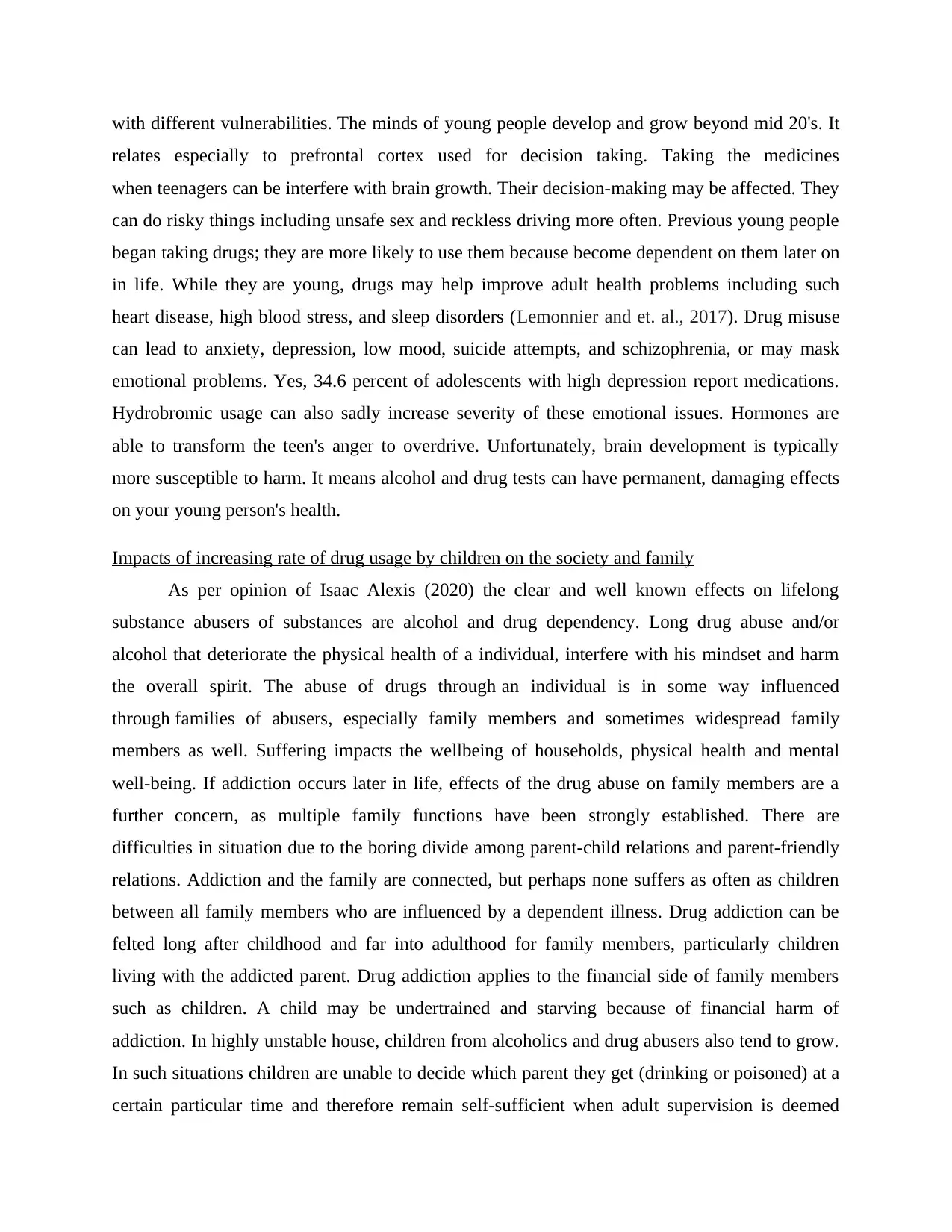
with different vulnerabilities. The minds of young people develop and grow beyond mid 20's. It
relates especially to prefrontal cortex used for decision taking. Taking the medicines
when teenagers can be interfere with brain growth. Their decision-making may be affected. They
can do risky things including unsafe sex and reckless driving more often. Previous young people
began taking drugs; they are more likely to use them because become dependent on them later on
in life. While they are young, drugs may help improve adult health problems including such
heart disease, high blood stress, and sleep disorders (Lemonnier and et. al., 2017). Drug misuse
can lead to anxiety, depression, low mood, suicide attempts, and schizophrenia, or may mask
emotional problems. Yes, 34.6 percent of adolescents with high depression report medications.
Hydrobromic usage can also sadly increase severity of these emotional issues. Hormones are
able to transform the teen's anger to overdrive. Unfortunately, brain development is typically
more susceptible to harm. It means alcohol and drug tests can have permanent, damaging effects
on your young person's health.
Impacts of increasing rate of drug usage by children on the society and family
As per opinion of Isaac Alexis (2020) the clear and well known effects on lifelong
substance abusers of substances are alcohol and drug dependency. Long drug abuse and/or
alcohol that deteriorate the physical health of a individual, interfere with his mindset and harm
the overall spirit. The abuse of drugs through an individual is in some way influenced
through families of abusers, especially family members and sometimes widespread family
members as well. Suffering impacts the wellbeing of households, physical health and mental
well-being. If addiction occurs later in life, effects of the drug abuse on family members are a
further concern, as multiple family functions have been strongly established. There are
difficulties in situation due to the boring divide among parent-child relations and parent-friendly
relations. Addiction and the family are connected, but perhaps none suffers as often as children
between all family members who are influenced by a dependent illness. Drug addiction can be
felted long after childhood and far into adulthood for family members, particularly children
living with the addicted parent. Drug addiction applies to the financial side of family members
such as children. A child may be undertrained and starving because of financial harm of
addiction. In highly unstable house, children from alcoholics and drug abusers also tend to grow.
In such situations children are unable to decide which parent they get (drinking or poisoned) at a
certain particular time and therefore remain self-sufficient when adult supervision is deemed
relates especially to prefrontal cortex used for decision taking. Taking the medicines
when teenagers can be interfere with brain growth. Their decision-making may be affected. They
can do risky things including unsafe sex and reckless driving more often. Previous young people
began taking drugs; they are more likely to use them because become dependent on them later on
in life. While they are young, drugs may help improve adult health problems including such
heart disease, high blood stress, and sleep disorders (Lemonnier and et. al., 2017). Drug misuse
can lead to anxiety, depression, low mood, suicide attempts, and schizophrenia, or may mask
emotional problems. Yes, 34.6 percent of adolescents with high depression report medications.
Hydrobromic usage can also sadly increase severity of these emotional issues. Hormones are
able to transform the teen's anger to overdrive. Unfortunately, brain development is typically
more susceptible to harm. It means alcohol and drug tests can have permanent, damaging effects
on your young person's health.
Impacts of increasing rate of drug usage by children on the society and family
As per opinion of Isaac Alexis (2020) the clear and well known effects on lifelong
substance abusers of substances are alcohol and drug dependency. Long drug abuse and/or
alcohol that deteriorate the physical health of a individual, interfere with his mindset and harm
the overall spirit. The abuse of drugs through an individual is in some way influenced
through families of abusers, especially family members and sometimes widespread family
members as well. Suffering impacts the wellbeing of households, physical health and mental
well-being. If addiction occurs later in life, effects of the drug abuse on family members are a
further concern, as multiple family functions have been strongly established. There are
difficulties in situation due to the boring divide among parent-child relations and parent-friendly
relations. Addiction and the family are connected, but perhaps none suffers as often as children
between all family members who are influenced by a dependent illness. Drug addiction can be
felted long after childhood and far into adulthood for family members, particularly children
living with the addicted parent. Drug addiction applies to the financial side of family members
such as children. A child may be undertrained and starving because of financial harm of
addiction. In highly unstable house, children from alcoholics and drug abusers also tend to grow.
In such situations children are unable to decide which parent they get (drinking or poisoned) at a
certain particular time and therefore remain self-sufficient when adult supervision is deemed
⊘ This is a preview!⊘
Do you want full access?
Subscribe today to unlock all pages.

Trusted by 1+ million students worldwide
1 out of 42
Related Documents
Your All-in-One AI-Powered Toolkit for Academic Success.
+13062052269
info@desklib.com
Available 24*7 on WhatsApp / Email
![[object Object]](/_next/static/media/star-bottom.7253800d.svg)
Unlock your academic potential
Copyright © 2020–2026 A2Z Services. All Rights Reserved. Developed and managed by ZUCOL.




